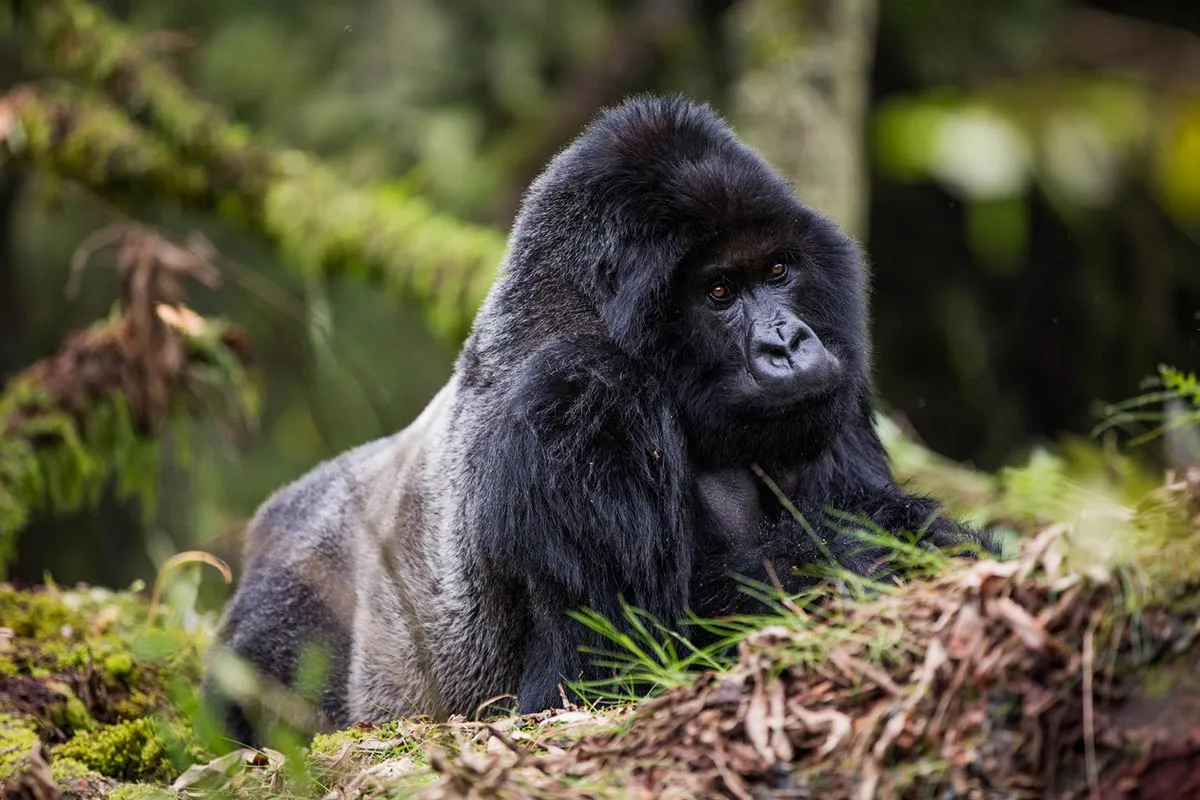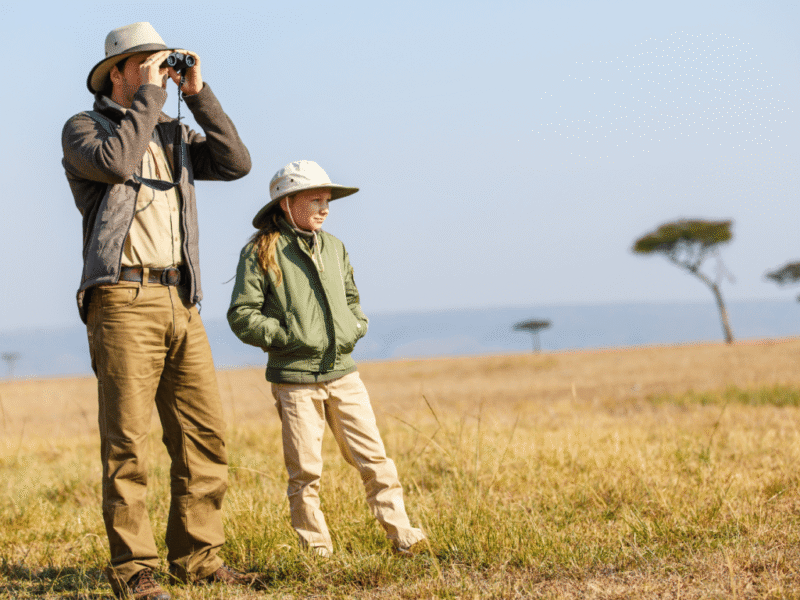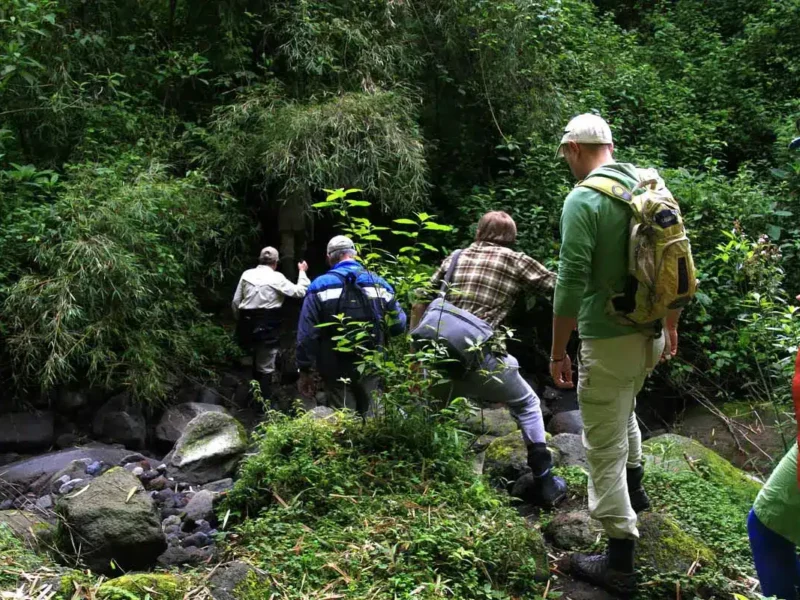
Gorilla Cultural Safari Etiquette
September 3, 2025
Do Gorillas Recognize Tourists?
September 7, 2025The Secret Social Politics of Gorilla Families in Bwindi
How Hierarchy, Dominance, and Family Bonds Work Among Gorilla Groups

A Safari into the Heart of Bwindi’s Social World
Beyond this captivating image lies a deeper truth, the secret social politics of gorilla families in Bwindi. Lives in complex groups where hierarchy, dominance and family bonds shape every interaction.
This endangered primate When travellers plan a Uganda gorilla safari, the first thought is often about the thrill of walking through the Bwindi Impenetrable Forest.
The misty trails, the dense greenery, and the unforgettable sight of a silverback leading his family create lasting memories.
Understanding these dynamics does more than enrich a Uganda gorilla trekking experience.
It connects visitors to the inner lives of gorillas, making every safari encounter more meaningful.
Tourists often ask where to stay on a Uganda gorilla safari, when to go or what to pack, but few realize that witnessing gorilla social life is as important as logistics.
Choosing the right Uganda gorilla safari lodges not only ensures comfort but also offers cultural experiences with local communities like the Batwa, adding depth to the adventure.
Ngeye Tours and Travel creates journeys that combine gorilla trekking with cultural tours, birding safaris, and game drives across Uganda.
This article explores how gorilla families work, from the leadership of silverbacks to the nurturing bonds among mothers, providing insight into why gorilla trekking safaris remain the best way to discover Africa’s wilderness.
Silverback Leadership – The Core of Gorilla Hierarchy
The social politics of gorilla families in Bwindi revolve around the silverback.
His dominance defines group stability, safety, and decision making.
A silverback earns leadership not by birthright alone but through strength, wisdom, and the ability to protect.
When tourists embark on Uganda gorilla trekking adventures, they often notice how the silverback moves first, scans the forest, and determines where the family rests or feeds.
His presence maintains order, reducing conflicts within the group.
Dominance, however, is not only about aggression.
A silverback shows care by breaking branches to clear paths for young ones or grooming others to strengthen bonds.
This mixture of power and empathy allows him to hold authority.
Observing such leadership during a Uganda gorilla safari is a rare chance to witness how animals mirror human-like governance.
When travellers from Europe, Asia, or America ask when to go for a Uganda gorilla safari, the answer often highlights the dry seasons for easier trekking.
Yet no season changes the importance of watching a silverback enforce discipline and ensure harmony.
Choosing Uganda gorilla safari lodges near trailheads makes access to these groups easier, allowing more intimate encounters with gorilla politics.
The sight of a dominant male managing family life is a reward that transcends simple wildlife viewing.
Mothers and Infants – The Bonds That Sustain Gorilla Families
Beyond hierarchy, the real heart of gorilla families in Bwindi lies in the bond between mothers and their infants.
A mother never strays far from her child, carrying it on her back during long treks or nursing it during quiet moments.
These intimate interactions reveal a softer side of gorilla life.
During Uganda gorilla trekking, travellers often feel moved by the gentle touch of a mother adjusting her baby’s position or the playful attempts of infants learning to climb.
Such scenes answer the common question of what to pack for a Uganda gorilla safari.
A camera with enough storage is essential, as missing these interactions would be a loss.
Mothers teach survival skills, from foraging to social behaviour, preparing the young to integrate into the group.
The silverback protects these pairs fiercely, recognizing their role in continuing the family lineage.
Choosing where to stay on a Uganda gorilla safari influences how easily one can witness these nurturing moments.
Lodges near habituated gorilla groups offer shorter treks and higher chances of encountering mothers with infants.
Cultural tours in nearby villages also help visitors understand how human families mirror gorilla families in their values of protection and nurture.
The secret social politics of gorilla families in Bwindi are incomplete without appreciating these bonds that ensure survival across generations.
Juveniles and Adolescents – The Future of the Family
Every gorilla family includes juveniles and adolescents whose playful energy adds balance to group life.
These young gorillas often wrestle, chase, and swing from vines, creating moments of joy during Uganda gorilla trekking.
Yet their play serves a purpose, teaching them social skills, testing physical strength, and preparing them for adult roles.
The social politics of gorilla families in Bwindi dictate that juveniles respect the silverback’s authority.
However, they also form close friendships that later determine alliances within the group.
When tourists from Europe, Asia, or America wonder where to go for the best Uganda gorilla safaris, the answer often includes Bwindi, because observing juveniles reveals how future leaders develop.
Uganda gorilla safari lodges enhance this experience by offering cultural storytelling in the evenings, allowing travellers to reflect on the similarities between human adolescence and gorilla growth.
Knowing when to go for a Uganda gorilla safari also matters, as dry seasons provide easier access to families with active young members.
The politics of growth and learning among juveniles show that the future of gorilla families depends on both discipline and exploration.
Female Alliances and Social Balance
Another layer of the secret social politics of gorilla families in Bwindi lies in female relationships.
Females form subtle alliances that influence group decisions, often clustering around trusted companions for grooming or food sharing.
These bonds provide stability, especially when tensions rise within the family.
During Uganda gorilla trekking, travellers sometimes observe females moving together while foraging, a sign of silent cooperation.
Though the silverback leads, female bonds maintain harmony.
They also determine whether a family remains united, or experiences splits when tensions grow.
This makes Uganda gorilla safaris not only about dominance but also about cooperation.
Travelers often ask what to pack for a Uganda gorilla safari, and the answer always includes patience, because observing these subtle dynamics requires time.
Choosing where to stay on a Uganda gorilla safari becomes crucial for this, as lodges near multiple groups increase the chance of seeing different social behaviours.
Around these lodges, cultural tours with local communities enrich the experience further, showing how women play similar stabilizing roles in human societies.
Conflict, Resolution, and Power Shifts
There is no family without conflict, and the social politics of gorilla families in Bwindi include disputes over food, resting spots, or breeding rights.
The silverback usually resolves these with displays of strength, chest beating, or vocal warnings. Rarely does he need to fight, because his dominance discourages challenges.
However, younger males sometimes test boundaries, leading to power shifts within the group.
When a new silverback rises, the entire family reorganizes.
Such transitions reveal the fragile balance of gorilla hierarchy and remind visitors of the constant evolution of social life.
Tourists embarking on Uganda gorilla safaris during such times gain insights that few experiences can match.
When planning Uganda gorilla trekking from Europe, Asia, or America, travellers often ask when to go.
The answer often focuses on weather, but timing can also align with fascinating social changes within families.
Staying at Uganda gorilla safari lodges near active groups allows repeat visits, offering chances to see leadership struggles unfold.
These moments make gorilla trekking safaris more than just nature walks—they become lessons in resilience and adaptation.
Cultural Experiences Beyond Gorilla Trekking
A journey into the secret social politics of gorilla families in Bwindi is incomplete without cultural exploration.
Many Uganda gorilla safari lodges collaborate with the Batwa people, who share stories of life before the forest became a national park.
Visitors can learn traditional dances, listen to folklore, and witness how ancient knowledge about plants and survival mirrors gorilla behaviour.
When travellers ask where to stay on a Uganda gorilla safari, the best choices often include lodges that integrate cultural programs.
These experiences complement Uganda gorilla trekking by offering context on how human and gorilla families both depend on cooperation, hierarchy, and resilience.
Combined with birding tours, chimpanzee tracking, and game drives in nearby Queen Elizabeth National Park, the journey becomes a holistic Uganda safari holiday.
Such combinations answer another vital question: what to pack for a Uganda gorilla safari? Beyond trekking gear, one should bring openness to cultural learning.
This mindset ensures the safari becomes not only an encounter with gorillas but also a connection with Uganda’s heritage.
Why Gorilla Politics Enrich Every Safari
The secret social politics of gorilla families in Bwindi reveal that trekking is not just about spotting wildlife. It is about witnessing leadership, bonding, conflict, and resilience.
These dynamics make every Uganda gorilla safari an exploration of life itself.
When travellers from Europe, Asia, or America choose Uganda gorilla trekking, they engage with a story older than humanity, where hierarchy and family remain timeless.
Questions such as when to go for a Uganda gorilla safari, what to pack, or where to stay matter, but the deeper reward lies in understanding the politics of gorilla families.
Choosing Uganda gorilla safari lodges that combine trekking with cultural tours ensures travellers gain both comfort and knowledge.
By sharing these insights, Ngeye Tours and Travel affirms its commitment to offering not only safaris but also trusted knowledge.
The secret social politics of gorilla families in Bwindi become a mirror for human society, proving that gorilla trekking safaris remain one of the most meaningful adventures in Africa




